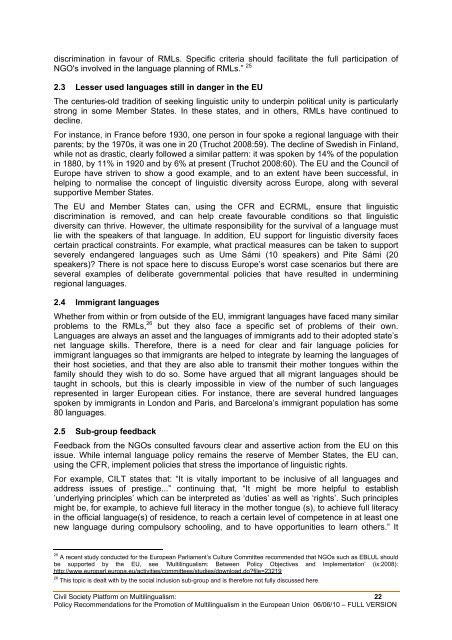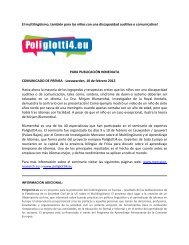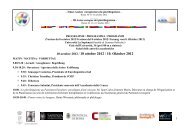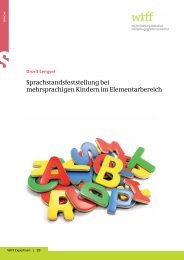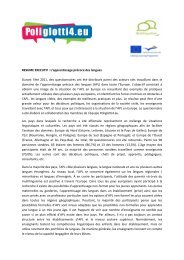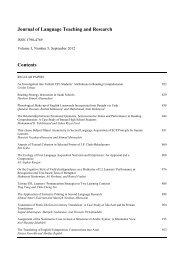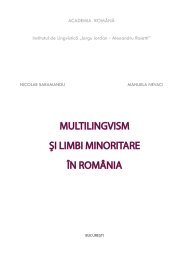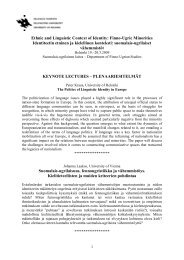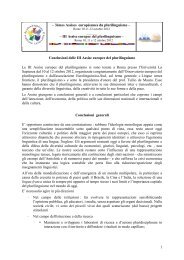FULL VERSION - European Commission - Europa
FULL VERSION - European Commission - Europa
FULL VERSION - European Commission - Europa
You also want an ePaper? Increase the reach of your titles
YUMPU automatically turns print PDFs into web optimized ePapers that Google loves.
discrimination in favour of RMLs. Specific criteria should facilitate the full participation ofNGO's involved in the language planning of RMLs.” 252.3 Lesser used languages still in danger in the EUThe centuries-old tradition of seeking linguistic unity to underpin political unity is particularlystrong in some Member States. In these states, and in others, RMLs have continued todecline.For instance, in France before 1930, one person in four spoke a regional language with theirparents; by the 1970s, it was one in 20 (Truchot 2008:59). The decline of Swedish in Finland,while not as drastic, clearly followed a similar pattern: it was spoken by 14% of the populationin 1880, by 11% in 1920 and by 6% at present (Truchot 2008:60). The EU and the Council ofEurope have striven to show a good example, and to an extent have been successful, inhelping to normalise the concept of linguistic diversity across Europe, along with severalsupportive Member States.The EU and Member States can, using the CFR and ECRML, ensure that linguisticdiscrimination is removed, and can help create favourable conditions so that linguisticdiversity can thrive. However, the ultimate responsibility for the survival of a language mustlie with the speakers of that language. In addition, EU support for linguistic diversity facescertain practical constraints. For example, what practical measures can be taken to supportseverely endangered languages such as Ume Sámi (10 speakers) and Pite Sámi (20speakers)? There is not space here to discuss Europe’s worst case scenarios but there areseveral examples of deliberate governmental policies that have resulted in underminingregional languages.2.4 Immigrant languagesWhether from within or from outside of the EU, immigrant languages have faced many similarproblems to the RMLs, 26 but they also face a specific set of problems of their own.Languages are always an asset and the languages of immigrants add to their adopted state’snet language skills. Therefore, there is a need for clear and fair language policies forimmigrant languages so that immigrants are helped to integrate by learning the languages oftheir host societies, and that they are also able to transmit their mother tongues within thefamily should they wish to do so. Some have argued that all migrant languages should betaught in schools, but this is clearly impossible in view of the number of such languagesrepresented in larger <strong>European</strong> cities. For instance, there are several hundred languagesspoken by immigrants in London and Paris, and Barcelona’s immigrant population has some80 languages.2.5 Sub-group feedbackFeedback from the NGOs consulted favours clear and assertive action from the EU on thisissue. While internal language policy remains the reserve of Member States, the EU can,using the CFR, implement policies that stress the importance of linguistic rights.For example, CILT states that: “It is vitally important to be inclusive of all languages andaddress issues of prestige...” continuing that, “It might be more helpful to establish’underlying principles’ which can be interpreted as ‘duties’ as well as ‘rights’. Such principlesmight be, for example, to achieve full literacy in the mother tongue (s), to achieve full literacyin the official language(s) of residence, to reach a certain level of competence in at least onenew language during compulsory schooling, and to have opportunities to learn others.” It25A recent study conducted for the <strong>European</strong> Parliament’s Culture Committee recommended that NGOs such as EBLUL shouldbe supported by the EU, see ‘Multilingualism: Between Policy Objectives and Implementation’ (ix:2008):http://www.europarl.europa.eu/activities/committees/studies/download.do?file=2321926This topic is dealt with by the social inclusion sub-group and is therefore not fully discussed here.Civil Society Platform on Multilingualism: 22Policy Recommendations for the Promotion of Multilingualism in the <strong>European</strong> Union 06/06/10 – <strong>FULL</strong> <strong>VERSION</strong>


